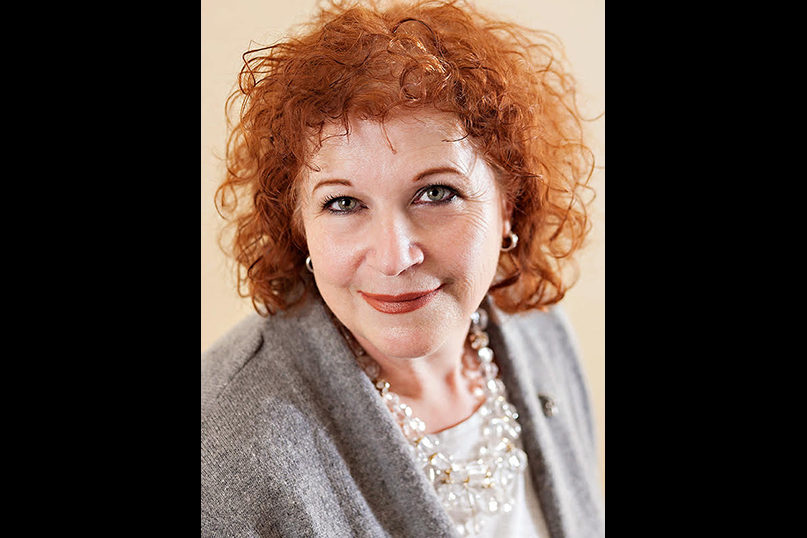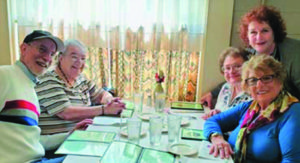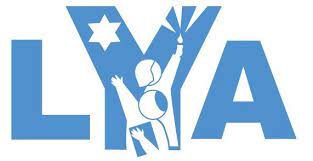
By Stacey Dresner
NEW LONDON – For the past month Carin Savel has been getting to know the area around New London as she settles into her position as the new executive director of the Jewish Federation of Eastern Connecticut.

Carin Savel (standing) recently visited Colchester where she met with Congregation Ahavath Achim’s Rabbi Ken Alter (left), and a few members of the congregation, including (l to r) Selma Nirenstein, Roz Plotkin and Sheila Horvitz.
She’s meeting community members at the opening of the Federation’s International Film Festival; going to annual meetings at synagogues and plans to go to services at all the shuls. She had coffee for the first time at Muddy Waters Café; strolled through the Art Walk in Stonington; and did a lunch-and-learn with Colchester Rabbi Kenneth Alter.
“People are calling,” Savel says. “I spent the day in Colchester with the rabbi there. I saw the synagogue, had lunch with a lovely group of women. I’ve been to Norwich. All of the rabbis have been very welcoming to me. We’ve met and had conversations. Last week I went to peoples’ homes for dinner. I can’t look at my Facebook account every day without seeing a new add – ‘Let’s be friends’ – from somebody else in the community. For someone who has come to the state of Connecticut not knowing anybody, this has been an extraordinary welcome for me.”
Savel may not know Connecticut, but she knows how to get things done in the Jewish community.
Succeeding Jerry Fischer, who formally retires as the agency’s executive director on June 28, Savel comes to the area after running the Jewish Federation of Raleigh-Cary, North Carolina for the past four years.
Under her watch in Raleigh, the governor signed an anti-BDS (Boycott, Divestment and Sanctions) bill into law and the Jewish Federation’s annual campaign broke records.
“Carin is terrific, energetic, experienced, knowledgeable and sociable. She has determination – all of the things we were looking for in an executive director,” Fischer said.
Besides getting the lay of the land, Savel has spent her time in New London settling into the Federation offices in the charming Victorian house on Channing Street that was once the home of the town’s first Jewish cantor. While full of charm, the house was also full of stuff, collected by Fischer during his 35 years at the Federation’s helm. One of the first things Savel did in the past month was, well, tidy up.
“I had my piles of things over the years,” admitted Fischer. “In Arab and Hebrew, I had a ‘tel’ – an archeological mound. So now she is starting with a clean slate.”
When Savel decided to head north, she was invited to the Federation’s New London office for what turned out to be, in Savel’s words, “a haimishe community interview process.
“They made it so that I could meet with individuals, with groups of people, and did a lot of Q&As. What I got was a lot of honesty – ‘this is what we are facing in this community.’ But we love where we are, and we love being Jewish – we just want more of it.”
Learning to help others
A native New Yorker, Savel’s maternal ancestors were Hungarian Jews who had lived in New York for generations. Her father’s parents left Russia in the early 1920s, but were turned away form American shores owing to the quotas that were then in effect.
“Rather than go back to Russia they got back on the boat and went to Cuba. My father was born there,” she says.
Her father’s family eventually made it to the U.S. a few years later, settling in New York.
Savel and her family, which included a brother and sister, grew up in Manhattan in a Conservative Jewish household where her she was taught about the importance of helping others.
“[In the 1960s and ‘70s] my parents would take trips to Russia. My mother would leave the house with my father and they would be dressed up. She would be wearing a fur coat covered in diamonds with a gorgeous hat and more diamonds, and this was a woman who never wore jewelry. And so they would leave on this trip and come back in cloth coats with no jewelry.”
Savel and her two siblings were asked annually to clean out their closets – saving one thing for themselves – with most of their clothing going to the needy.
She also remembers dinners at her house with strangers who didn’t speak English sitting around the table.
“My parents were literally helping Jews out of Russia and they did this for years,” Savel recalls. “I knew [that] if you could raise money you could help people. When I got into the non-profit world that was really my forethought. That you could do these great things but you must be able to support it. It was this intrinsic knowledge, this simple idea, that even one person can do something to help.”
Savel majored in drama at Syracuse University – which served her well in her professional and personal life.
“[Through drama] you learn not to be afraid of speaking to big crowds. You develop a love of communicating, in whatever form that takes – music or dance or talking. I definitely am a major fan of the arts.”
In her early 20s she started her own business, called Carin Savel Incorporated – or CSI, although this was years before the television crime forensics show.
“We were a packaging house – I worked in the music industry early on and when a record company would contact us and say, ‘Here is this artist. Would you package them?’ We dressed them and presented them and branded them. We worked with artists like Celine Dion and Debbie Gibson.”
“What this job did for me was open my eyes to [the idea] that you can’t have ‘great’ ideas unless everyone else thinks it’s something wonderful; unless you are sure this is what people want.”
Eventually, Savel decided to leave the corporate world.
“I knew I had to do something to help the world,” she says.
Every vote counts
She began her first non-profit job as director of corporate responsibility with LIFEbeat: The Music Industry Fights AIDS, raising money for AIDS education. One of the events she oversaw was a concert by Barbra Streisand in Madison Square Garden.
But, after four years, she was burnt out. So, she took a job with the United Way and moved to North Carolina.
“I was stunned,” she laughs. “First of all I couldn’t understand anything anyone was saying. But I was doing marketing communications and fundraising and really loved it.”
One day Rick Glazier, one of her son’s Hebrew schoolteachers came to see her.
“He said he was thinking of running for the State House in North Carolina and wanted me to run his race and raise money. I had never done anything like that before, so I said sure,” she says, laughing at her own chutzpah.
“I didn’t think it would be anything big,” she recalls, “but it turns out he was running against Alex Warner, an eight-term incumbent whose yard signs had crosses on them. That was what his message was. We needed to raise $50,000 to make any kind of dent. We raised over $100,000. And we defeated him by 123 votes. So, if anyone ever thinks their vote doesn’t count – it counts!”
She served on Rep. Glazier’s senior staff for eight years as senior policy director and caucus communications spokesperson.
In 2014 she was recruited by United Way to serve as senior vice president of resource development and strategic communications at United Way of the Pioneer Valley in Springfield, Mass. It was there that she was tapped by Meredith Dragon, then executive director of the Jewish Federation of Western Mass., to chair its Jewish Community Relations Committee (JCRC).
“On my first day at the United Way I met Meredith Dragon and she said we are so glad to have you in the community and we know you have political and government expertise, we’d like you to run our JCRC,” says Savel.
One of the issues Savel dealt with while chairing the JCRC was concerning BDS stickers that had been placed on Sabra Hummus containers in a Springfield Big Y store.
She learned that that was tampering with food in a grocery store was a federal offense. She called Big Y and they quickly rectified the problem.
Soon after that the Jewish Council on Public Affairs (JCPA) invited her to join a leadership mission to Israel. (She later became a JCPA board member.)
At a meeting at the Yitzhak Rabin Center, Shimon Peres walked in, sat down in an empty seat at the table, and spoke.
“He addressed all of us about our responsibilities as Jews,” she recalls. “He asked what I did and I said I was working at the United Way and volunteering for the Jewish Federation. He was adamant that I had my glasses on backwards. [He said] I should be volunteering for the United Way and I should be working for the Jews. So what do you do when Shimon Peres tells you you should be working for the Jews? You go home and say I have to go.
“I called the Federation in New York and said, ‘Find me a Federation.’”
She eventually went to Raleigh because she was already familiar with the area, which had been named one of the fastest-growing cities in the U.S.
It wasn’t long before she brought PJ Library to the town.
“I called the Harold Grinspoon Foundation and said, ‘I’m not in Longmeadow anymore, I’m in Raleigh, and I need to bring PJ here because we’re sitting on a gold mine… They had 100 families who were on the national PJ Library register, and within the first six months we had 700 families signed up.”
In 2017, she and the heads of other North Carolina Jewish Federations worked hard to make sure that North Carolina Gov. Roy Cooper signed into law legislation that would bar the state from doing business with companies that boycott Israel.
Around the same time, Savel contacted other North Carolina Jewish Federations and organized the first Jewish Federations Israeli legislator reception in honor of Israel’s 70th birthday. It was attended by more than 200 legislators from the state senate and house of representatives.
When her contract was up in Raleigh this year, she decided it was time to go.
“I missed my New York and New England Jews,” she laughs. “And I was ready. I had taken them as far as they could go. We broke all of our fundraising records, our attendance records. I really left them a very vibrant community.”
Some might say Savel left a young, growing Jewish community for one that has seen a decline in numbers over recent years.
But Savel doesn’t buy into that.
“The first misnomer I heard was that we are just an ‘aging’ community. But I’ve met people of all ages and people with a great deal of energy,” she says. “You can’t have a young community without having a traditional community that preceded them and that is what we have here in Eastern Connecticut. We have a vibrant, traditional community. I have been absolutely blown away. From the moment I arrived here I have been welcomed so warmly.”
As for what her goals as head of the Federation are, she says she is still assessing things.
“What I’m working on now is meeting people and listening,” she notes. “Every place you go is a challenge. You can view it as a challenge, but I never do; I view it as an opportunity. I look for the doors of opportunities – not what’s going to slam in my face. So when I hear things like we’re not doing this or not doing that, that means very little to me. I’m looking for the things that we can do; for the ways that we can move forward.”








 Southern New England Jewish Ledger
Southern New England Jewish Ledger










